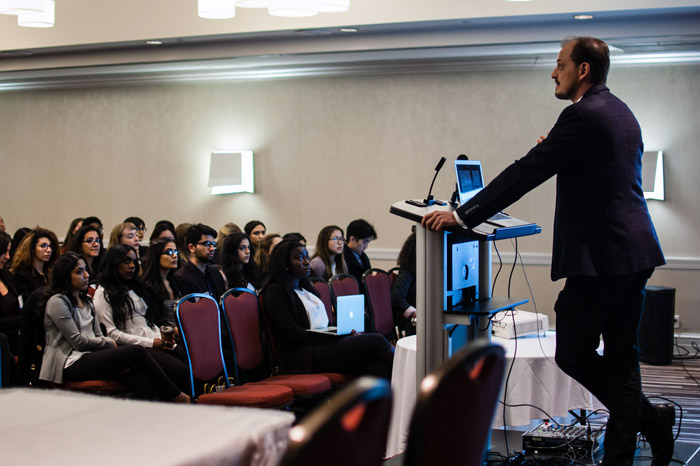Three days, hundreds of delegates and one goal: To inspire people to talk and think critically about public health. The Montreal World Health Organization Simulation (MonWHO) kicked off on Friday March 18, bringing together students from universities all around Quebec to gain insight into public health. This year’s theme was non-communicable diseases, a topic especially relevant given aging populations in developed countries.
“This […] theme will challenge delegates to reexamine how we tackle disease prevention and how we manage our responses to disease,” Alexandria Petit-Thorne, executive director of MonWHO, wrote in an open letter to prospective delegates.
One of the most exciting parts of MonWHO is its Global Health Fair. The Fair brings in organizations from the Montreal community to network with students, providing delegates the opportunity to learn about internships and volunteer opportunities available to them which contribute to global health efforts. Organizations, whic have participated in the past, have included MEDLIFE McGill and Aids Community Care Montreal.
“The Global Health Fair was introduced to the MonWHO conference in 2008 with the aim to showcase the global health initiatives, such as clubs and organizations, around the McGill and Montreal community,” event organizer Ga Eun Lee explained. “It is an educational space for both organization representatives and conference participants to share perspectives on global health issues and solutions, and to provide opportunities for delegates to get involved.”
The Fair’s goal is to take students out of the fantasy world of simulation and into the real world by providing them with information on how they can have an impact on public health.
“As part of the MonWHO mission statement, the secretariat aims to ‘raise student awareness about global health issues’ and to ‘provide a means for students to play a proactive role in global health policy,’” Lee said. “The Global Health Fair was created in 2008 to fulfill these statements by educating delegates about the various global health initiatives that contribute to advancing health around the world.”
MonWHO also draws students from more diverse backgrounds than traditional Model UN (MUN) conferences.
“[The delegates at MonWHO are] people who are really passionate about the [issue,]” said Juliana Fanous, chargé d’affaires at MonWHO. “It’s not the type of thing that has the [flashiness] that Model UN has.”
This is largely tied to the students who are participating in the event.
“[Our delegate backgrounds are] very interdisciplinary,” Fanous said. “We [get] a lot of students from different backgrounds, from sociology to microbiology, so we [get] a lot of diverse opinions that are brought into debates.”
Many participants at the event mentioned the shared passion and interest in global health as one of the highlights of the event.
“It was an interesting crossover between tiptoeing into policy but at the same time being with other people who are interested in global health,” McGill student Emilia Chatelier said.
Another aspect participants cited as being particularly engaging was the role-playing component of the conference.
“What I liked was that we were put in the country’s perspective[s],” McGill alumnus Alexandre Chadi said. “We were asked to prepare beforehand. It was really interesting to put yourself in that mindframe, and to start voicing and arguing for that country, being really an advocate. So all of these political aspects came into play.”
But the political issues remained secondary to the main goal of addressing public health problems.
“There’s a lot of attention that goes into conferences like Model UN, which focuses on issues of more of a political nature, and there wasn’t a lot focused on issues pertaining to global health, and it’s an issue that a lot of students care about,” event organizer Angela Yang said. “The goal of MonWHO is to stimulate discussion and debate on [global health] and encourage students to […] gain experience in drafting solutions and policy work.”









